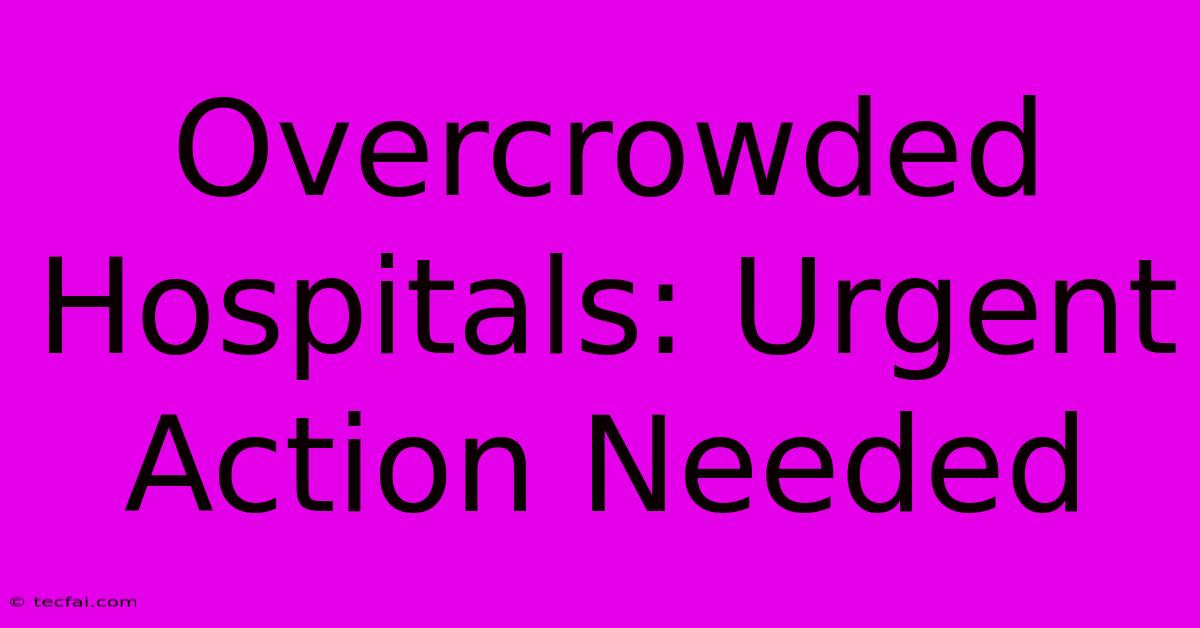Overcrowded Hospitals: Urgent Action Needed

Discover more detailed and exciting information on our website. Click the link below to start your adventure: Visit Best Website tecfai.com. Don't miss out!
Table of Contents
Overcrowded Hospitals: Urgent Action Needed
Overcrowded hospitals are a global crisis, impacting patient care, staff wellbeing, and overall healthcare system efficiency. This critical issue demands immediate and comprehensive action. From strained resources to compromised safety, the consequences of overflowing hospitals are far-reaching and demand our urgent attention. This article delves into the causes, consequences, and potential solutions to this pressing problem.
The Root Causes of Hospital Overcrowding
Several interconnected factors contribute to the persistent problem of overcrowded hospitals:
1. Shortage of Healthcare Professionals:
A significant driver is the persistent shortage of doctors, nurses, and other healthcare professionals. Burnout, aging populations, and insufficient training programs all contribute to this critical gap in staffing levels. Understaffed hospitals struggle to manage patient flow effectively, leading to delays and increased congestion.
2. Limited Bed Capacity:
Many healthcare systems grapple with a chronic lack of hospital beds. This is especially true in areas with rapidly growing populations or aging infrastructures. Insufficient bed capacity directly translates to longer wait times in emergency rooms and other departments, exacerbating overcrowding.
3. Inefficient Discharge Processes:
Slow and inefficient discharge processes contribute significantly to bed blockage. Patients who are medically ready for discharge may experience delays due to logistical challenges like arranging home care, finding suitable long-term care facilities, or navigating insurance complexities.
4. Increased Demand for Healthcare Services:
An aging global population, coupled with the rising prevalence of chronic diseases, places an increasing demand on healthcare systems. This surge in demand often outpaces the capacity of hospitals to accommodate all patients efficiently.
5. Ineffective Emergency Department Management:
Emergency departments (EDs) often serve as the primary point of entry for patients, and inefficient management within these crucial departments can lead to significant bottlenecks and overcrowding throughout the hospital. This includes issues with triage, patient flow, and appropriate resource allocation.
The Dire Consequences of Overcrowded Hospitals
The consequences of consistently overcrowded hospitals extend far beyond mere inconvenience. They pose serious risks to both patients and healthcare workers:
1. Compromised Patient Safety:
Overcrowding significantly increases the risk of medical errors, infections, and patient harm. Limited space and strained resources make it difficult to provide the level of care and attention each patient deserves, potentially leading to adverse health outcomes.
2. Reduced Quality of Care:
Overworked and stressed healthcare professionals may find it challenging to provide optimal care in overcrowded environments. This can lead to reduced attention to detail, delays in treatment, and a diminished overall quality of patient care.
3. Increased Healthcare Costs:
Overcrowding often leads to lengthier hospital stays and increased utilization of resources. This translates to higher overall healthcare costs, impacting both patients and the healthcare system as a whole.
4. Staff Burnout and Moral Distress:
The constant pressure and demanding environment of an overcrowded hospital can lead to significant burnout and moral distress among healthcare professionals. This contributes to staff shortages, further exacerbating the problem.
Urgent Action: Solutions for Addressing Overcrowding
Addressing the issue of hospital overcrowding requires a multifaceted approach involving collaboration between policymakers, healthcare administrators, and healthcare professionals:
1. Investing in Healthcare Infrastructure:
Increased investment in hospital infrastructure is essential, including building new facilities, expanding existing ones, and modernizing outdated equipment. This includes investing in sufficient bed capacity to meet the growing demand for healthcare services.
2. Strengthening the Healthcare Workforce:
Addressing the shortage of healthcare professionals is crucial. This involves initiatives to attract and retain healthcare workers, increase training capacity, and improve working conditions to reduce burnout.
3. Improving Discharge Processes:
Streamlining and optimizing discharge processes, including better coordination of home care and long-term care facilities, can significantly improve hospital bed availability and reduce overcrowding.
4. Implementing Advanced Technology:
Investing in technology solutions such as telehealth, remote monitoring, and electronic health records can improve efficiency, reduce administrative burden, and enhance patient care.
5. Public Health Initiatives:
Promoting preventative healthcare measures can reduce the demand for hospital care by addressing underlying health issues before they escalate into emergencies.
Addressing the problem of overcrowded hospitals requires a sustained commitment to implementing these solutions and a comprehensive strategy that tackles the multifaceted nature of this global challenge. Only through collaborative efforts and decisive action can we alleviate the burden on our healthcare systems and ensure that all patients receive the safe and effective care they deserve.

Thank you for visiting our website wich cover about Overcrowded Hospitals: Urgent Action Needed. We hope the information provided has been useful to you. Feel free to contact us if you have any questions or need further assistance. See you next time and dont miss to bookmark.
Featured Posts
-
Lille Player Transfer Rumours Heat Up
Dec 03, 2024
-
Ffos Las Tips Uk Horse Racing
Dec 03, 2024
-
Super League New Transfer Rules
Dec 03, 2024
-
Gerwyn Price Rejects Darts Invite
Dec 03, 2024
-
Serenas Honest Take Second Childs Love
Dec 03, 2024
